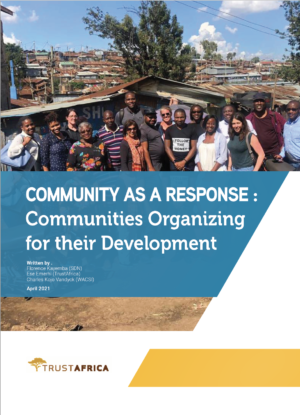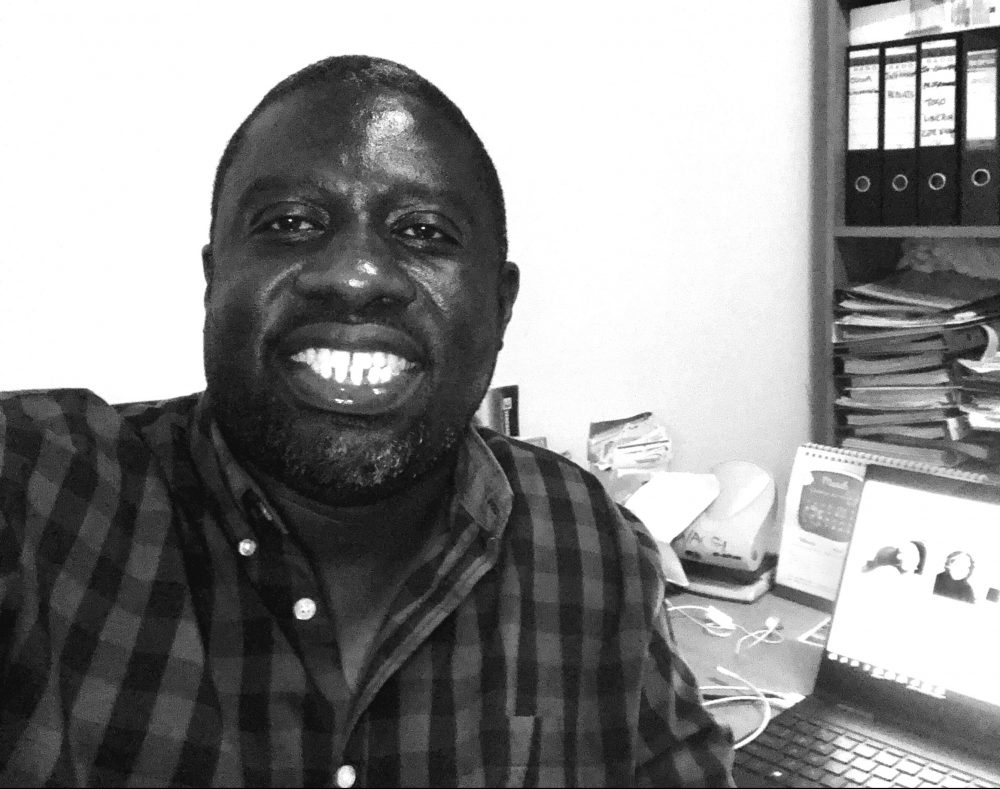This article was originally published by TrustAfrica.
In March 2021, the World Communities Forum brought together organizations working with local communities to reflect on the past year and how Covid-19 has impacted the work that they do. TrustAfrica hosted a breakout session on “Community as a Response: Communities Organizing for their Development” on Day 1 of the virtual conference to tease out what are the enablers in supporting local communities in self-organizing for their development. The breakout session was facilitated by development practitioners and community leaders Ese Emerhi (TrustAfrica – Nigeria), Florence Kayemba (Stakeholders Democracy Network – Nigeria), and Charles Kojo Vandyck (West Africa Civil Society Institute – Ghana).
This follow-up article elevates key recommendations offered during the breakout session, by first giving some context on the challenges faced by local communities (often in conflict) and centering the article on factors that have enabled communities to respond to development challenges, including what priority interventions donors should invest in to support community actors to build resilience when responding to power dynamics within the broken aid system in the Global South.
***
In 2019, the African Union adopted the theme ‘Silencing the Guns’ for the year 2020. The initiative aimed at preventing and stopping all forms of violent conflict by the end of 2020. However, the onset of the Covid-19 pandemic and its attendant effects on emerging economies on the continent presented new challenges that governments are still grappling with, more than a year later. The causes and enablers of violent conflict in Sub-Saharan region are varied as they are numerous – from West Africa to the Great Lakes region, non-state armed groups have continued to demonstrate that the state no longer has monopoly of the legitimate use of violence. With the increased proliferation of small arms and light weapons, weak governance, and a burgeoning youth population in these states, it has become increasingly important to rethink and redesign community organizing.
The fragmentation of communities resulting from the different types of violent conflict presents new challenges for community organizing. Social cohesion which is essential in helping communities work together for a common cause has been eroded in areas where criminal gangs and violent extremist groups continue to operate and where there is limited state presence. How do we organize communities so they can work together for a common cause in these contexts? What type of assets can we harness in communities that are devastated by conflict and where the state has limited presence? This is particularly important in situations where there is no access to justice for crimes committed by perpetrators – this has contributed to cyclical violence as voices of victims are drowned in political rhetoric and empty promises from politicians, some of whom have used these conflicts to their political advantages.
The challenges that communities are faced with in the Global South within these turbulent times cannot be responded to with the same adhoc, activity-based, and short-term development thinking that we are all accustomed to, where communities are seen as a “problem to be fixed.” There is a growing recognition that community actors, now more than ever, are longing for effective and accessible ways to participate in shaping their future. This situation has put the spotlight on the need for traditional institutional donors to contribute more effectively to shifting power from a top-bottom to a bottom-up approach where community citizens own and decide their development agenda.
An intensification of community-led development through research, documentation, and shared learning is essential to facilitate this transformation. This means engaging with community actors through a co-investment relationship and recognizing that the communities that they represent have essential resources including social, reputational, and trust assets that often have more intrinsic value than funds.
Could it be a coincidence, then, that as we write this article about what communities need for self-organizing for their development, Mark Lowcock – the coordinator of the UN’s aid relief operation since 2017 – admits he has now realized that “the multibillion-dollar humanitarian system is struggling because unaccountable aid agencies are not listening to what people say they need and instead are deciding for them.” That is because local communities have long been ignored and often find themselves on the wrong side of the power dynamics in aid (where less than 2 percent of humanitarian aid goes to local grassroots organizations). Despite and because of this, local communities have had to turn to themselves and their partners to seek ways of strengthening their communities, together and with trust.
Relationships matter, and whenever there is a crisis, people tend to turn to those with whom they have built and sustained relationships for solutions and a way forward. Local community philanthropy, when it embeds the principles of trust, local knowledge, relationships, and assets/contributions, has proven to be a strong value-based alternative development practice. When asked directly to state what factor has enabled communities to respond to development challenges facing local communities, over 53 percent of the breakout session audience responded that it was “experience sharing networks with other community leaders/organizations” that saw them through that challenge. Community organizations were able to respond so rapidly to Covid-19 because they had strong local networks of donors and allies already in place – they understood who was doing what and where the gaps were that needed filling, mobilizing local resources to do so.
Community-led development and local community philanthropy, when used as a deliberate strategy for development, is one where the future is equally negotiated and participatory, and where solutions are co-owned. All assets in community-led philanthropy are valued, from the in-kind to volunteers, from money to local expertise/knowledge, nothing is seen as lesser-than and not useful. As Cecile Richards, co-founder of the SuperMajority said, “The beauty of community organizing when done right is that we start to take others along with us.”
The challenge and opportunity now are for donors to support community resilience in more empowering and innovative ways through coordinated and coherent efforts to increase investments in empowering community actors to adopt alternative funding mechanisms, income mobilization and generation approaches. There are also opportunities for development partners to leverage on their assets and networks to identify resourceful means to support the development of experience sharing and technical skills exchange opportunities. A potential cutting-edge approach could be through a shared economy mechanism to maximize the circulation of knowledge, indigenous models, and durable solutions within local communities
Photo by Ian Macharia on Unsplash

